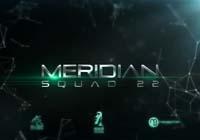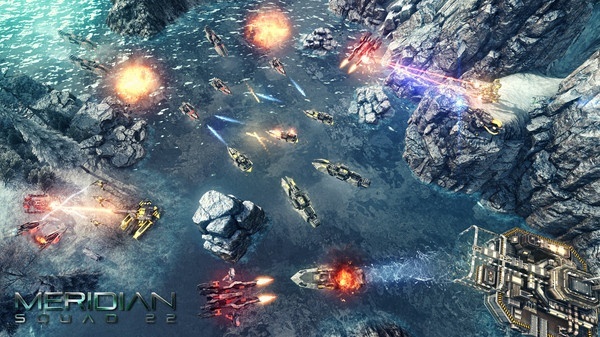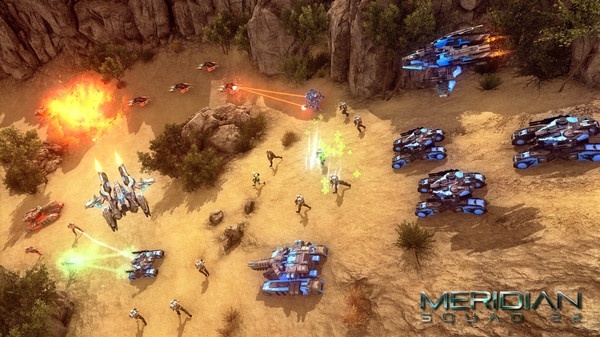Meridian: Squad 22 (PC) Review
By Eric Ace  10.09.2016
10.09.2016

Meridian: Squad 22, developed by Solar Shifter EX's Elder Games, is a real-time strategy affair that takes place on a planet humans are trying to subdue to be colonised for the over-populated Earth. In a genre packed full of classics from over the years, it is very important to either find a special niche to entice fans, or polish up existing ideas so much that it is almost impossible to overlook a newcomer to the mass of strategy releases. The question is, which side of the fence does Meridian: Squad 22 fall onto? Following on from an early hands-on look, this is a question that Cubed3 is about to answer now the final product is here…
Meridian: Squad 22 takes place in a future where the Earth is over-populated and the first scouting mission to the new planet Meridian is wiped out. You are the next people up to take the planet on. It plays on a set map where there is one resource to mine, build up a base, set up an army, and roll out. Standard and basic RTS conventions apply here, and the simplifying down to a single resource is not a major problem.
Everything feels completely like the old Command and Conquer series, especially the original ones back in the '90s. Not to dismiss this game, but to clarify what the player is getting into. Many new titles have a million units, each of them do something different, tons of abilities, and so on. Not here, as there are something like 10 total units, and they all do vaguely the same thing, and not a single unit has a 'special ability.'
Base construction works around building miners who mine the crystal and build the buildings. The system they chose is interesting: there is a population limit based on how many expansions are controlled, which is only allowed in pre-set locations. That means on one base the limit is something like 20 units, two bases goes up to 30, and so on. This can be modified, but that is the general idea. There is the infantry, vehicle, and air base to build units out of, and it is all very simple, yet that's not to say it's bad.

Likely the best feature is the way research is conducted. Through each map 'research canisters' are hidden - attack, defence, or economy - and the aim is to find these while playing, which adds a great tension to each level. By finding these, there is a research tree of sorts that the points are spent on, and stay with the player for the entire campaign. It adds a feeling of seriousness to choices as they are permanent and far-reaching. It is something like 'unlock new air unit,' which then opens up a path for increasing damage, or going for a new unit. It would be easy to criticise some choices as obvious or unbalanced, but overall the system is very enjoyable and the most notable part of the game.
Units die fast, and there is a constant battle to keep the army resupplied, this is where it feels more like the old-school games. There is not a lot of logistic stuff to take care of, population limits go up without anything when you expand, there aren't really support buildings, just continue building more production buildings and keep pressing on.

Now, here are the problems: first, all the units are essentially the same, which is very disappointing. There is the standard infantry, a few other types, some mech units, and some air units. With no abilities to speak of, the only difference is stats, and here they are all basically the same. Mechs costs a bit more, take a bit more damage and do a bit more, but it is hardly noticeable. Everything does nearly the same, taking nearly the same, and works identically to everything else. When this is realized, there is no point to do anything beyond just spam infantry, which works in nearly all circumstances.
Further, the population mechanic becomes very steam rolling, one way or the other. If the player gets a fast expansion or two, they can raise their army to huge numbers and the game is very number heavy, as you either win overwhelming or lose the same. Thus, in early fights, if you have the advantage, the entire map is won, which is problematic especially when you are on the other side of the equation.
Another problem, which is hard to forgive, is the lack of UI and control over units. There is a hotkey function but it is very, very basic. Units can be assigned to a hotkey once only. You cannot add or subtract units, short of reselecting the entire group at one time and hotkey again. This means trying to separate units out is a nightmare. Buildings cannot be stacked on a hotkey, either, making many numbers devoted solely to buildings.

Lastly, units have a lag start up time on attack. Units will march into attack range (which appears to be nearly the same for every unit), turn, lift their gun, and fire. Any order to move will cause unit to lower the gun, turn, move, and then lift the gun and fire. This means there is no tactical option when a battle is occurring, such as 'dancing' or 'stutter-stepping,' which made some of other RTS games amazing to watch in the hands of pros. In this, all it means is send the guys in, hope the numbers are higher… and then wait.
The story is also very hit and miss. The idea that the player is part of the second team sent in after the first team got destroyed is a compelling plot point, yet is rarely touched on again. There is a vague evil corporation story that has a few interesting points but it all feels a bit forgettable. There are some side missions where it is the main characters on missions, which are pretty cool, but despite the availability for time to characterise the characters, there is no feeling of them having importance or being relatable to at all.
Overall, Meridian: Squad 22 will satisfy someone with an itch for RTS. Its passable in all regards but there are some things that are going to give pause to people as they realise it is not a top-tier release, lacking that special edge to lift it above the strong competition within the bustling genre.

Cubed3 Rating
Good
Meridian: Squad 22 has all the basics of what makes a successful RTS game. The core is solid, and the hunting of the research canisters is a highlight. The problems come from how the controls are unforgivably outdated - especially with squad control/hotkeys - how all units are fundamentally the same, and the fact that the plot that had a lot of potential never actually goes anywhere in the end. It is enjoyable for a quick romp, if someone has a deep craving for a sci-fi RTS, but there are flaws here that prevent it from being great and tackling the greatest of greats within the genre.
Comments
Comments are currently disabled

 Sign In
Sign In Game Details
Game Details
 Out now
Out now  Out now
Out now  None
None  Out now
Out now  Subscribe to this topic
Subscribe to this topic Features
Features






 Top
Top

